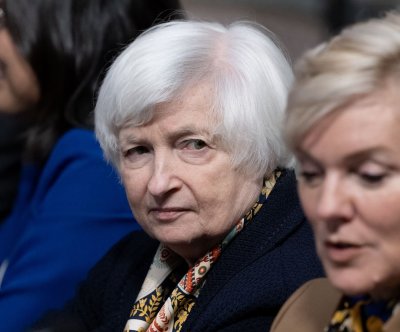U.S. sanctions UAE shipping company for violating Russia oil price cap

The U.S. Treasury under Secretary Janet Yellen on Thursday sanctioned a UAE-based shipping company on allegations it violated a Russian oil price cap of $60 per barrel. File Photo by Michael Reynolds/UPI | License Photo
Jan. 19 (UPI) — The Biden administration has sanctioned a United Arab Emirates-based shipping company for violating an oil price cap placed on Russia over its war in Ukraine, making it the first such enforcement of the year, the U.S. Treasury said.
“Today’s actions once again demonstrate that anyone who violates the price cap will face the consequences,” Deputy Secretary of the Treasury Wally Adeyemo said in a statement Thursday.
“No one should doubt our coalition’s commitment to stopping those who help the Kremlin.”
The Treasury on Thursday sanctioned the United Arab Emirates-based shipping firm Hennesea Holdings, blocking all property and interests in property under its name in the United States, as well as barring any U.S. person from doing business with it.
The Treasury’s Office Foreign Assets Control on Thursday also designated 18 of the company’s vessels. Among them is the HS Atlantica, which was previously identified for having transported Russian crude priced above a $60 per barrel oil cap the United States and its democratic allies instituted in December 2022 in an effort to punish Moscow over the war it launched in February of that year in Ukraine and to limit its revenue.
Treasury officials on Thursday said that before the price cap went into effect, Hennesea bought up older tankers known for shipping Russia crude and petroleum products, and which have repeatedly made port calls in Russia, despite the restrictions.
“We are steadfast in our commitment to hindering evasion that helps Russia fund its illegal war against Ukraine,” State Department spokesman Matthew Miller said in a statement.
The United States is part of an international coalition of countries known as the Price Cap Coalition, which has committed to restricting the sale of Russian crude oil and petroleum products unless they are bought at or below the $60 price cap.
The move is intended to maintain a reliable supply of crude oil and petroleum products in the global market while reducing the effectiveness of one of Russia’s most important revenue sources.
In December, the Treasury sanctioned a tanker owned by the Russian government along with a handful of traders on accusations of having frequently transported Russia oil in circumvention of the price cap.
The United States has said its sanctions and oil price cap have taken a bite out of the Russian economy and have hindered its ability to make war.
In August, the Treasury said the price cap was working, having frozen half of Russia’s reserves, impaired its military industrial complex and cut its oil revenues by 50% compared to a year ago.
